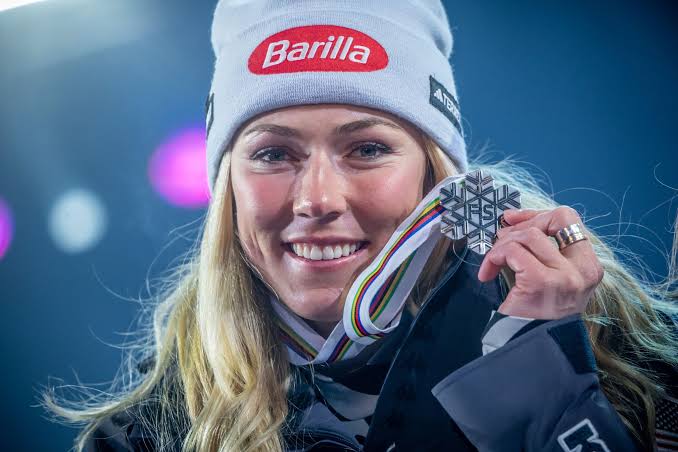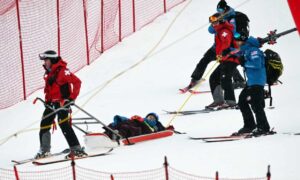
Mikaela Shiffrin Faces Career Crossroads: Flirting with Retirement, But Skips Downhills as She Eyes Milestone
Mikaela Shiffrin, one of the most decorated alpine skiers in history, is at a pivotal moment in her illustrious career. With retirement rumors swirling, Shiffrin has sparked controversy by choosing to scale back her involvement in downhill races, a decision that has ignited debate within the skiing community. As she edges closer to smashing historical records, including Ingemar Stenmark’s longstanding achievement of 86 World Cup wins, her decision to bypass certain races raises questions about the legacy she aims to leave behind.
For a sport defined by its relentless physical and mental demands, Shiffrin’s decision to step away from downhill events—some of the most thrilling but dangerous races in alpine skiing—has sparked mixed reactions. Is this a sign of a waning passion or simply a calculated strategy to prolong her career and avoid injury? Either way, it’s a move that has left fans and critics alike divided.
The Retirement Speculation: A Well-Deserved Exit or Untimely Retreat?
At only 29 years old, Shiffrin has accomplished more than many athletes dream of in a lifetime. Yet, whispers of her retirement have grown louder in recent months, particularly after she expressed exhaustion from the emotional toll of competing at such a high level for over a decade. The tragic death of her father in 2020 and her return to dominance despite personal loss have also led many to speculate that she may soon step away from the sport entirely.
However, Shiffrin’s decision to pull back from downhill races rather than retire outright suggests she’s not quite ready to hang up her skis. For some, it feels like she’s cherry-picking her way to victory—focusing on the technical disciplines like slalom and giant slalom, where her skills are most refined and the risks are lower. For others, it’s a smart move to preserve her longevity in the sport, especially as she nears iconic milestones that could cement her status as the greatest skier of all time.
Why Skip Downhills? The Risk vs. Reward Equation
The downhill events, known for their speed and danger, are unforgiving. One wrong move at 90 mph can result in career-ending injuries or worse. Shiffrin’s hesitation to continue competing in these high-risk races reflects a growing trend in professional sports where athletes are prioritizing their mental and physical well-being over relentless competition. After all, Shiffrin has nothing left to prove—she’s already broken records, dominated podiums, and set new standards for excellence in alpine skiing.
But for critics, skipping downhills feels like a strategic evasion. Downhill races are a test of complete skiing mastery, requiring not just technical precision but fearlessness and a willingness to push limits. By opting out, some argue that Shiffrin is sidestepping the full challenge of alpine skiing. Is she protecting her legacy by focusing on what she’s best at, or is she dodging the ultimate test of her greatness?
A Milestone in Sight: Chasing Stenmark’s Record
Despite the retirement chatter, Shiffrin’s sights remain firmly set on one final goal: surpassing Ingemar Stenmark’s 86 World Cup victories. With 88 wins as of 2024, Shiffrin has already etched her name into skiing history, but breaking Stenmark’s record remains the ultimate crowning achievement. As she inches closer, her selective approach to competing seems calculated—only participating in the races where she has the highest chance of success while avoiding unnecessary risks.
This has led to fierce debate about the nature of athletic greatness. Should athletes prioritize winning above all else, even if it means avoiding challenges that could jeopardize their success? Or should they embrace the full spectrum of competition, regardless of the risks? Shiffrin’s choices reflect the delicate balance between ambition and self-preservation—a balance that few athletes are able to maintain as they near the end of their careers.
The Future of Mikaela Shiffrin: What’s Next?
As Shiffrin continues her quest for greatness, the question remains: how will her legacy be defined? Will she be remembered as the greatest alpine skier of all time, a technical master who played it smart in her later years, or will critics focus on her decision to skip the more grueling aspects of the sport? Whatever the outcome, Mikaela Shiffrin’s impact on alpine skiing is undeniable.
For now, the world watches as she approaches yet another career milestone, with the tantalizing possibility of more records falling in the seasons to come. Whether she chooses to retire after achieving her goals or continues competing, Shiffrin’s legacy as one of the most controversial and remarkable figures in sports history is already secure. But the debates surrounding her choices will continue, and only time will tell how the skiing world will judge her final acts on the slopes.






